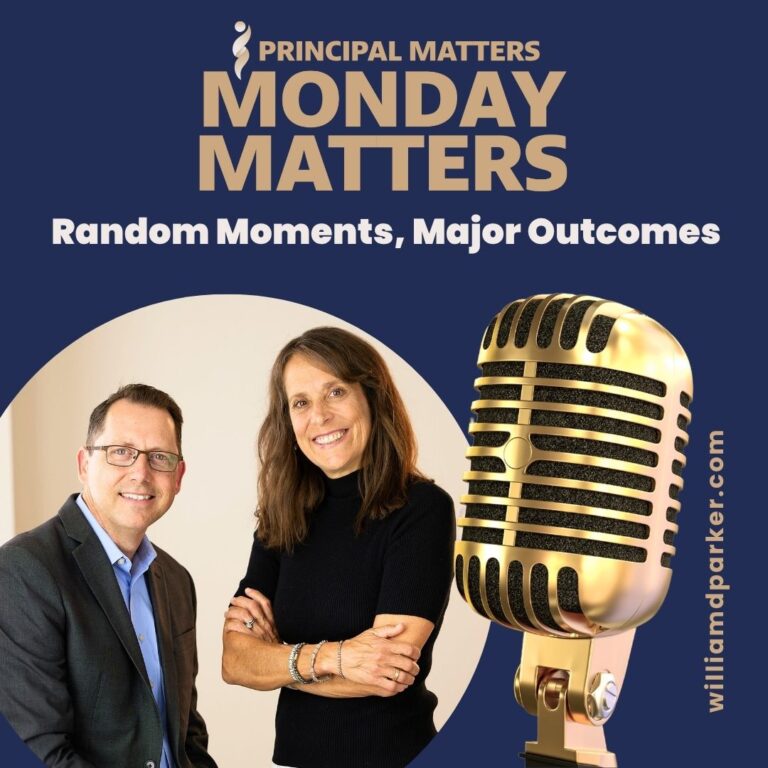Podcast: Play in new window | Download
The other night I was invited to visit a university classroom with sixteen educators who are working on graduate degrees in educational leadership
I listened to each of them present vision and mission statements related to their work with students. It was obvious they had a strong understanding of the road ahead–they understood the “why” of school leadership. I was encouraged and optimistic thinking about the future of our schools in the hands of these potential leaders.
At the end of the evening, I was asked to say a few words to the students. I wanted to give them both a reality check as well as some encouraging reminders. So, I broke the conversation into two parts. Part I: Five things you should know about school leadership. And Part II: Five reasons why you will be strong school leaders. If you know someone preparing for a move into administration, these takeaways may be helpful for them too. Or they be good reminders for veteran admins who need a perspective check as well.
Part I: Five things you should know about school leadership
1. You will fail.
I know this doesn’t seem encouraging, but I think it is important to realize that leadership comes with lots of challenges. I often tell new admins to imagine the most challenging moments from their classroom experiences—the day when you had a major conflict with a student you go home thinking about the rest of the evening.
Now multiply that ten times a day. Every day is different, but so many of them include resolving conflicts that are larger or more complex than what you encountered while teaching. Or at least those conflicts are yours to manage on a larger, school-wide scale now instead of for one classroom. The sooner you admit that you will not always do it perfectly the better.
Failing doesn’t mean you are a failure. It means you do your best with the information, policies, and relationships as you see them. Over time you become better at resolving conflicts. If you’re committed to constantly growing, you will keep trying new ideas or practices. No success comes without some failure. So be courageous and accept you won’t do the work with perfection.
2. When you do fail, learn from it and take the next best step.
Knowing you will not always be perfect doesn’t mean not being professional or decisive. When you have good policies, procedures and people, you will have the best structure for managing a school like a good classroom. But when you make the wrong call, take a breath, assess what can be done differently the next step. And then keep moving forward with new knowledge in hand.
For instance, I remember one time when I accused a girl for a theft from a locker. The incident had happened after school in a dark hallway, and her description matched some sketchy footage from on our school camera. But as I probed further, I realized I had the wrong kid. We eventually found the right one, but it was humbling when I realized how I had made the innocent student feel like a criminal in the process. Of course, I apologized to the student and her parents, and they forgave me.
But I have kept this lesson in mind over the many more years I had to deal with other crazy situations. If I gave up on working with students because I’m not perfect, I would have never kept serving after my first year.
3. Never stop being a learner; you never figure it all out.
Earning a degree or moving into a new position never means you have arrived at a final destination. And practicing something for twenty years doesn’t mean you know it all either. It’s okay to admit when you don’t know the answer to an important question, but it’s even more important to know how to find answers to questions you have. Just as we want our teachers and students to be life-long learners, we can’t give others the impression that we know it all. This doesn’t mean you don’t demonstrate confidence, assertiveness, or take command of situations. It means you stay real in the process of leading others.
4. Be fair, firm, consistent.
Leaders support and serve others by creating the best environment possible for learning. Although you won’t be perfect, it important for others to see you demonstrating what you expect from them. You must be willing to confront situations with truth, openness, and clarity. And you must consistently implement and enforce your expectations. Your students and teachers deserve the kind of treatment you appreciated as a student and teacher. Remember what I once heard someone say when you’re unsure what to do in a tough situation: Ask yourself, “What would a great leader do?” Then do that.
5. Treat others with the grace you didn’t deserve.
There are two sides to the leadership coin: one the one hand, you are responsible for enforcing rules, guiding policy, and building a learning community; on the other hand, you must hold others accountable when that is not happening. But when you must exercise authority with others, use the same courtesy you would want if the tables were turned.
I once had another admin tell me that a student’s mother was talking about me after I had issued a long-term suspension with her child. My friend said, “Will, I wanted you to know she told me she had never been treated with so much dignity.” I was surprised and encouraged at the same time. Those situations don’t always turn out so well, but you can still do the hard parts of your job while giving others that kind of empathy and support you would want if you were on the other side of the desk.
Part II: Five reasons you will be a strong school leader
After I finished the first five takeaways, I wanted to change gears in the conversation to share why I believe these educators will be great school leaders. School leadership is hard work. If it wasn’t more people would be signing up for the opportunity. As I am meeting aspiring and present school leaders, I am growing more and more optimistic about the future of our schools. Here’s what I told them:
1. You love students.
Only people who are committed to encouraging the best in others need to be in school leadership. And school leaders who thrive are ones who are not afraid to care about students. This doesn’t mean you are soft in leadership. It does mean, however, that you are looking out for the best in others. Make your decisions with this question in mind: “What would I want my own child to experience in this school?”.
2. You understand the “why’ of your work.
When you have a deep sense of your vision for school, and you understand your mission is to create a strong learning environment for an entire school community, you will serve from a position of strength. So often I myself to not lead from either a position of fear or pride. Lead from a position of making life better for others.
3. You are a problem solver.
You wouldn’t be asked to lead if you hadn’t already proven your ability to find solutions. So much of school leadership involves answering questions that may not have been asked before. Understanding your policies, reaching out to others for clarification, and communicating a clear direction—these are all a part of being a good decision maker. Even when others disagree with a decision, it is better to be decisive than to let those around you be confused or unclear on what to expect.
4. You don’t rely on yourself for all the answers.
None of us is Super Man or Wonder Woman when it comes to school leadership. We must reach out to others for help. And we must surround ourselves with strong team members who will help us accomplish the tasks involved in leading a school. Look around you when you have a question. Reach out to others in your field you have more experience. You are always stronger when you refuse to operate in isolation.
5. You understand God is ultimately in control of all things.
I don’t like to talk about the day my oldest brother died. I grew up in a family with six children. My parents enjoy fourteen grandchildren and two great grandchildren. Six years ago, we were enjoying a family reunion when my oldest brother and my third brother were diving at a nearby lake. When they were drying off on the boat ramp, my oldest brother collapsed and died in the arms of my brother. I was there minutes after the ambulance arrived.
I’ll never forget realizing that with all my training in crisis management, this moment was completely beyond my control. Not only was it traumatic and life-changing, but over the next months and years, it has served as a wake-up call for me and my belief in God. In addition to the grief and pain of losing a brother, I also had a perspective check. I realized that much of what happens around us in beyond our control. How we respond to the moments around us is often as important as what is happening. In school leadership, you must learn to move forward with an assurance that God is ultimately in control of everything. When you do, you can rest in knowing that as long as you’re doing your best, you can trust him for peace in the process.
Let’s Wrap This Up
The sixteen educators I spoke to the other night were inspiring people. Some are seasoned teachers. Others are just starting their education careers. But whether it was the fifty-year-old coach who was finishing his Master’s degree or the young elementary teacher who dreams of becoming principal of her building, each one shared a story about why they were choosing the path of school leadership. They want to make a difference, to support teachers, to touch the lives of students, and to make schools wonderful places to be.
I don’t know if you are preparing for your first year in school leadership or beginning your last. But I am incredibly optimistic about the future of education. Yes, we have a lot of political mountains to climb to see schools better supported by public policy. Yes, we have cultural and community challenges to overcome. But that is why we need strong leaders. And leadership is messy. But accomplishing something wonderful usually is. To do this job well, keep these takeaways in mind:
- Accept that serving others cannot be done with perfection.
- Know you won’t always get it right, but keep moving forward.
- Know you can never stop being a learner.
- When faced with tough choices, do what a great leader would do.
- Keep learning from others.
- Understand the “why” of your work.
- Treat others with grace and dignity.
- Give yourself permission to love your students.
- Don’t fly solo but surround yourself with strong team members.
- Know that God is ultimately in control of the final outcomes.
Now It’s Your Turn
What is one action you can take today toward growing in your own service to others? Choose one of today’s takeaways, and reflect on how you can grow in this area of leadership.
Sign-Up For Free Updates and Ebook
When you enter your email address here, you will automatically receive my newest posts and a free Ebook, 8 Hats: Essential Roles for School Leaders. Let’s keep learning together!
Principal Matters–The Book!
School leaders are very busy, so each of the twenty-four chapters is designed as a quick-read and followed with take-action questions for follow-up or reflection. If you want practical ideas on understanding your purpose, managing school teams, dealing with challenges, and leading with courage, action, motivation, and teamwork, go HERE to pick up a copy for you or your team.
Messaging Matters
Harness the power of messaging to create a culture of acknowledgment, respect, and celebration. Written specially for leaders, this title is divided into three parts, helping readers to maximize their role as chief communicators with students, teachers, and parents and community. Each chapter includes suggestions for using digital tools to enhance messaging and ends with reflection questions and practical next steps.




